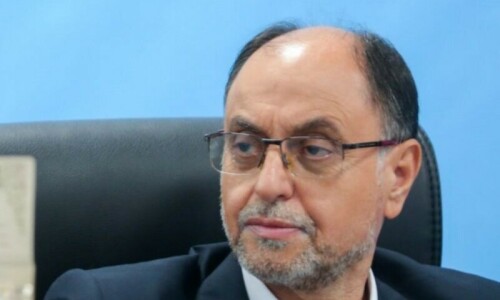PARIS: AIDS and malaria alone will kill close to three-quarters of a million Africans before leaders of the world’s wealthy nations try in July to break a deadlock over debt relief and funds to fight disease and poverty. After a failed weekend meeting, however, the G7 industrial powers appear more deeply at odds than ever over how raise the vast sums of money believed necessary to make real inroads against poverty and disease in sub-Saharan Africa.
Finance ministers from the United States, Britain, Germany, France, Italy, Britain, Japan and Canada could not agree once again on money last weekend, despite a World Bank report that they risk missing all the development goals they set in 2000 — the Millennium Development Goals (MDGs).
“Behind cold statistics on the MDGs are real people and lack of progress has immediate and tragic consequences,” the author of the report, Zia Qureshi, said earlier this month.
“Every week in the developing world, 200,000 children under five die of preventable disease, a tragedy on the scale of the recent Asian tsunami, that repeats itself every week.”
The MDG goals, agreed five years ago at the United Nations, include halving by 2015 the number who live on less than $1 a day, halting the spread of AIDS, malaria and tuberculosis.
It is a tall order when more than 310 million people out of a total sub-Saharan population of 700 million live on $1 a day or less, and where average life expectancy is less than 40 years in Zambia or Botswana, and little more in many other countries.
Malaria kills 3,000 a day or more than a million a year, according to the World Health Organization, while AIDS kills twice as many again and another 2-3 million die of pneumonia, influenza and diseases that can be prevented by vaccine.
WIDE RANGE OF VIEWS: Washington has ruled out Britain’s proposals that some of the gold reserves of the International Monetary Fund be used to fund a debt write-off and for a doubling of development aid to $100 billion a year through bond issues on capital markets.
Treasury Secretary John Snow said on Tuesday there was hope of agreement on relief for debts to the World Bank and African Development Bank, but not on IMF gold sales.
“It is inadvisable and not a course of action that we would want to support...I don’t see how they will ever be successful,” he said. Following British suggestions, an IMF report in March suggested it would be feasible to sell 13-16 million ounces of the IMF’s 103 million ounces of gold.
But the deadlock is not just due to US objections. Japan has its own different ideas on funding, and others too.
Even France, which backs Britain on the surface, does not agree to using the IMF’s gold for blanket debt write-offs.
“We are not hostile to gold sales but we’re not convinced it (the proceeds) should go to debt relief,” a French government official, speaking on condition of anonymity, said recently.
The official recalled Paris’s argument that the IMF and the World Bank are public organizations that need solid funding to continue to do their work, be it in Africa, or less destitute but still-fragile regions or emerging market economies.
They are anxious to head off pressure in some quarters for scaling back IMF intervention in financial crises of the kind seen in Argentina, Brazil and southeast Asia in the past decade.
The meeting of G7 financiers last weekend was the second since February and supposed to make headway before the July 6 summit in Gleneagles, Scotland, which Britain has turned into a sort of high-stakes deadline for a deal.
To many that is an understatement, but others think the US stand could shift under the pressure and publicity of a summit.
“My feeling is the Americans will give ground in Gleneagles because you cannot go to a development summit and not put anything on the table,” the French official said.
Before that summit there will be another meeting of finance ministers in London in June, and after the summit there is a special United Nations gathering in September to review what is already known to be poor progress on the MDG targets.
HEAVY DEBTS: Sub-Saharan Africa owed $68.9 billion in multilateral debt to organizations such as the World Bank, ADB and IMF, out of total foreign debt of $231.4 billion in 2003, according to the World Bank’s latest report, 2005 Global Development Finance.
Although that figure will recede under further phases of the existing HIPC debt relief scheme, it gives an idea of the money governments have to find at a time when they are all under pressure to rein in their own national debts and deficits.
Nonetheless, no leader wants to be seen vetoing help for Africa in Gleneagles or be perceived to have turned their back on the UN millennium development goals they all signed up to.
One of the ideas doing the rounds in the meantime is another that Washington and perhaps others will not back either — an international tax on jet fuel.—Reuters














































Dear visitor, the comments section is undergoing an overhaul and will return soon.